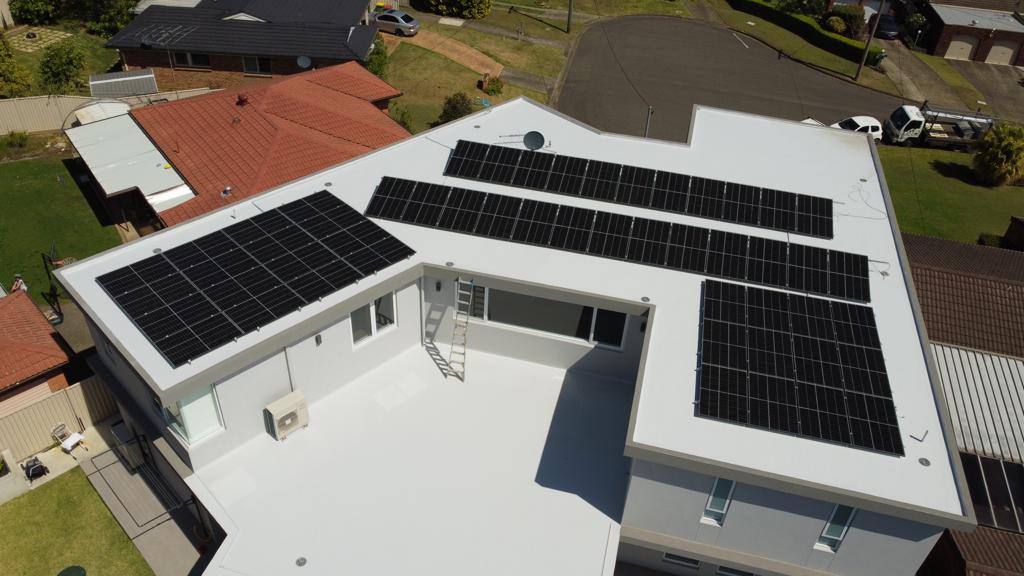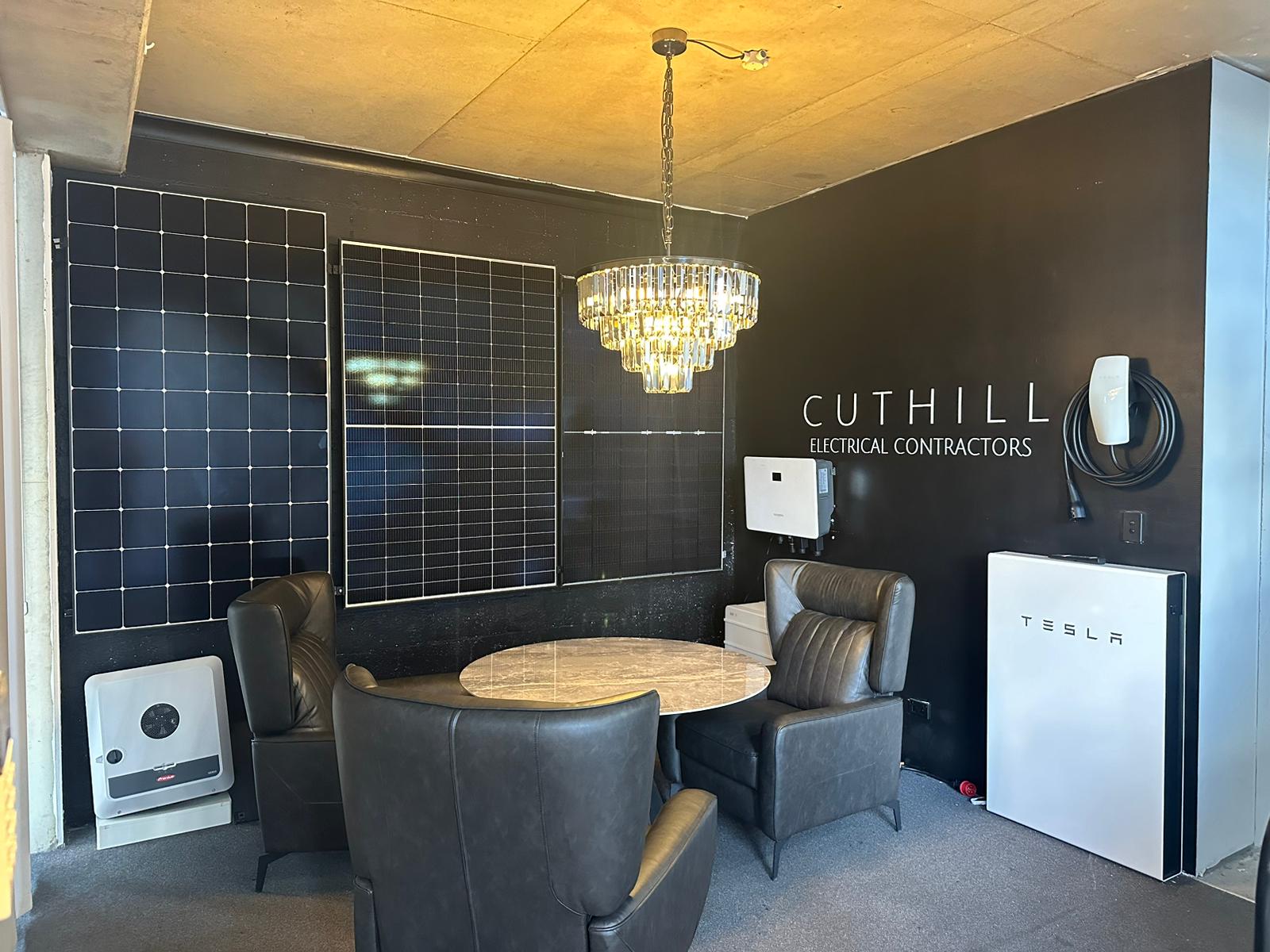Choosing the best solar panels can make all the difference in how much you save and how well they perform over time. Sydney’s sunny climate is perfect for solar, but finding the right panels can be overwhelming.
This guide by Cuthill Electrical Contractors will help you make the best choice for your home or business to simplify the process for you.
Understanding Solar Panels/Photovoltaic Technology
PV materials convert sunlight into electricity. A single PV cell produces about 1 or 2 watts of power. These cells, made of various semiconductor materials, are often thinner than four human hairs. Cells are protected by being sandwiched between layers of glass and/or plastics to endure outdoor conditions for many years.
To increase the power output of PV cells, they are linked together to form larger units called modules or panels. These modules can be used alone or connected with others to create arrays. One or more arrays are then linked to the electrical grid to form a complete PV system. A modular design like this helps PV systems meet almost any electricity demand.
PV modules and arrays have mounting structures to orient panels toward the sun and components to convert the direct current (DC) electricity from modules into the alternating current (AC) household appliances used.
Types of solar panels
Majorly there are two major kinds of solar panels: n-type and p-type. Both are quite popular and in demand among homeowners. If you understand their efficiency, performance, durability, and cost, you can choose the best solar energy system.
Usually, N-type solar panels have an efficiency level of 25.7%, which is why they perform better than p-type panels, having an efficiency of 23.6%. One known issue with p-type panels is light-induced degradation.
P-type panels are treated with boron, which can react with oxygen in the air and reduce a panel’s performance by up to 10% over time. Originally designed for space applications where oxygen is scarce, this was not initially a concern. However, p-type panels can be slightly less efficient for residential use on Earth than n-type panels.
Also, n-type solar panels have a longer life than p-type because of their durable construction. But p-type panels are more affordable comparatively.
Major types of panels-
Monocrystalline Modules
Monocrystalline modules are made using a semiconductor material called silicon, which is known for its efficient conversion of light into electricity. These panels use single silicon crystals, or monocrystalline ingots, which are complex to produce and result in higher costs than others. Some features of monocrystalline panels include:
- Higher cost due to the production of pure silicon crystals.
- High efficiency, often exceeding 20%.
- Available in higher power wattages, up to 600 Wp, leading to higher energy generation.
- Black-tinted cells.
- Available in half-cut cell technology, doubling the number of cells in a module and improving energy generation in shaded conditions.
Polycrystalline Modules
Polycrystalline modules use fragments of silicon crystals, also known as multi-crystalline modules. The silicon waste from pure crystal production is melted and molded into wafers, simplifying the manufacturing process and resulting in lower costs. Features of polycrystalline modules include:
- Lower cost compared to monocrystalline panels.
- Efficiency between 15-17%.
- Lower power output due to lower wattages.
- Blue-tinted cells.
Thin Film Modules
Thin film modules are lighter and slimmer than monocrystalline and polycrystalline modules and do not rely on silicon. They use substances like cadmium telluride, amorphous silicon, and copper indium gallium selenide placed between transparent conductive layers. Features of thin film modules include:
- Easy installation due to their light and thin design.
- Lower cost of manufacturing.
- Lowest efficiency and power output among solar panels.
- They have shorter lifespans, making them suitable for utility-scale projects rather than residential or commercial use.
- Available in blue or black tint, depending on the manufacturing material.
MONO PERC Modules
Mono PERC (Passivated Emitter and Rear Cell) is an upgraded version of monocrystalline modules. They feature an additional layer on the back of the solar cells to absorb more sunlight, improving overall efficiency.

Determining the size and power output of the panels
Using the rated wattage of a solar panel, you can easily calculate its daily power output using a simple formula:
For instance, if a 300W solar panel receives six hours of sunlight daily, the total power output is 300W x 6 = 1800Wh or 1.8 kWh.
This method calculates energy production by week, month, and year.
However, knowing the number of peak sunlight hours to expect might be challenging. Solar installation companies often provide tables of estimated exposure within their service area based on their experience. This information can help maximise panel placement.
Factors like fitting solar panels to a shed or garage and adding solar lights are also considered. The angle of the roof and ongoing weather conditions can also impact the actual energy production of solar panels.
Key factors to consider when choosing solar panels:
When choosing solar panels in Sydney or New South Wales, it’s important to consider a few key factors for optimal performance and cost-effectiveness.
Energy needs
Know your energy needs. How much energy you will actually need depends on the energy efficiency of your house appliances, how much power you use, and the size of your home. You can try a professional energy audit to help you understand your needs better.
Solar Panel Efficiency
One of the most important things when choosing an efficient panel is to check how well the panel can convert sunlight into electricity. The quicker it can convert, the more efficient it is. The most efficient solar panels have an efficiency rate of about 22% so look for panels offering a similar range of efficiency.
Panel Size
You should also consider the size of the solar panels when choosing a system. Bigger panels will produce more electricity but will also be more expensive and take up more space on your roof. Think about the size of your roof and how much electricity you need when choosing solar panels for your home.
Panel Wattage
The next important thing is the wattage of the solar panel. It tells you how much power your panel can produce. So, it would help if you looked for panels with high wattage ratings. However, panels with higher wattage can be expensive but will also generate more electricity, making them an efficient choice in the long run.
Cost
Whenever you invest in a solar panel, you are investing in the future. Long-lasting solar panels generate electricity for many years and save you a lot of money.
Brand Reputation
Brand reputation matters a lot. Always go for a brand that has experience and a good reputation for making quality products. Always trust brands that offer warranties and good customer service.

Government Rebate
Installing a new solar system with an accredited installer like CutHill Electrical Contractors qualifies you for Small-scale Technology Certificates (STCs) under the ‘solar rebate’ scheme. The number of STCs you get depends on your system’s size, where you are in Australia and the current STC market price. These certificates reflect the amount of eligible renewable electricity your system produces and can reduce your installation costs. The scheme is due to be finished in 2030.
Installation and maintenance
To achieve the best performance and durability from solar panels in Sydney, installing and maintaining them is important. Proper installation is critical for maximising energy production and minimising future issues. Regular maintenance is equally important to ensure panels operate efficiently, thus maximising energy savings.
When considering installing solar panels, selecting a reputable installer with the correct accreditations and certifications is crucial. Cuthill Electrical Contractors, a CEC-accredited installer with certifications like New Energy Tech approval, is a trusted choice for your solar panel installation in Sydney. They provide comprehensive services, ensuring smooth project management from beginning to end. With a focus on quality and reliability, along with their in-house facilities, they guarantee efficiency and precision throughout the installation process.
Regular maintenance is crucial for keeping your solar panels efficient. Cuthill Electrical Contractors offers services like inspections, cleaning, and performance monitoring to ensure your panels stay in top shape. With their expertise, you can trust your panels to keep generating clean energy for years, saving you money and helping the environment.
Consider panel efficiency, cost, quality, and environmental impact to make the right choice. Understanding the government rebate scheme and consulting with trusted installers like CutHill Electrical Contractors can help. With proper planning and maintenance, solar panels can offer clean, renewable energy for years, saving you money and benefiting the environment.







